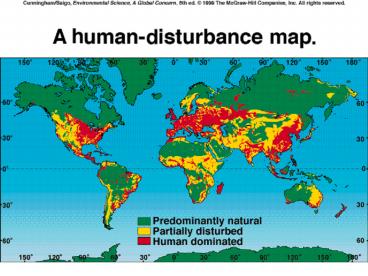BIODIVERSITY - PowerPoint PPT Presentation
Title:
BIODIVERSITY
Description:
... (9% inv) THE GREATEST THREAT HABITAT FRAGMENTATION SYSTEM REGULATORS 75% water recycled by ET 25% water lost in runoff Ground cover removal (%) ... – PowerPoint PPT presentation
Number of Views:27
Avg rating:3.0/5.0
Title: BIODIVERSITY
1
(No Transcript)
2
BIODIVERSITY
3
GOALS OF CONVENTION ON BIODIVERSITY
- gt 100,000 plant/animal species lost in last 5
years - Habitat loss is biggest current threat to
biodiversity - Deforestation and forest degradation has
increased - since the Rio Earth Summit
4
BIODIVERSITY
- How many species are there?
- -- 1.4 million named species (70 of which are
invertebrates) - -- 3 to 50 million species alive!
- -- Only 10 to 15 live in North America
5
(No Transcript)
6
(No Transcript)
7
(No Transcript)
8
(No Transcript)
9
WHAT THREATENS BIODIVERSITY?
- Background extinction (95 of all extinctions)
- Mass extinction
10
BIODIVERSITY
Background rates
- 1 mammal species
- every 400 years
- 1 bird species/200 yrs
- Now...
- 10,000 times the
- background rate!
- 20-75 plant/animal
- species each day?
11
ENDANGERED VS THREATENED
Threatened population low but extinction less
imminent Endangered nos so low that extinction
imminent
12
BIODIVERSITY
- 1. Small (localized) range
- 2. Extensive range but significantly modified by
humans - 3. Island dwellers (limited immigration isolated
evolution free from competitors, predators and
diseases and thus fewer defences when introduced) - Low reproductive success
- Large (easily hunted)
- 1973 ESA 1,254 species on E and T list (9 inv)
13
THE GREATEST THREAT
14
(No Transcript)
15
HABITAT FRAGMENTATION
16
(No Transcript)
17
SYSTEM REGULATORS
1000
75 water recycled by ET
Effective runoff (mm)
0
100
Ground cover removal ()
25 water lost in runoff
18
RATES OF DEFORESTATION
- 1981-1990
- 0.9/year
- 53,000 sq. mi./year
- 21,000 sq. mi. in
- South America (Amz)
- area of NC
- By 1988, /- 10 of
- the Amazon had been
- cut down
- Due to isolation of
- fragments and in
- forest/clearing
- boundaries 16
- affected by deforestation
19
(No Transcript)
20
(No Transcript)
21
(No Transcript)
22
(No Transcript)
23
http//www.rainforestweb.org/
24
CAUSES
- Swidden agriculture (slash-and-burn)
gt 60 of deforestation gt Rapid decline in soil
productivity (nutrient storage?) gt Can be
sustainable -- (15 - 20 year rotation) gt
Inequitable land ownership (e.g., Brazil where
only 5 of farmers own land)
25
CAUSES
- Commercial logging
- 21 of deforestation
- creaming of the most valuable hardwoods
- 1-2 trees per hectare taken (widespread damage)
- clearcut versus selective
26
CAUSES
- Cattle ranching
- 12 of deforestation
- frequently aided by government subsidies
- 2 trees destroyed for each hamburger made from
- tropical forest beef
27
WHY DEFORESTATION?
28
WHY DEFORESTATION?
- Complex
- Many underlying social problems giving impetus
to deforestation
gt over-consumption in industrialized countries gt
foreign debt gt poverty gt unequal ownership of
land gt overpopulation
Deforestation
29
WHAT CAN BE DONE?
1. The need to preserve intact sections of
tropical forest
gt The question of edge communities
30
WHAT CAN BE DONE?
2. The need to address the economic needs of the
lesser developed nations in which all of the
tropical forests reside
gt Are the ideas of commercial development and
maintaining the health of the environment
mutually exclusive?
31
WHAT CAN BE DONE?
- Broad-scale commercial and conservation
strategies need to be - developed but these must take into account the
economic and - environmental constraints of the particular
country (i.e., detailed - local knowledge!)
- There must be designated core and buffer
conservation zones - centered around areas of particular endemism
(other areas can - be designated for limited sustainable
commercial activities - (polycyclic logging, selective extraction of
forest products etc.)
32
Total area 39 ha core 2 Total
area 42 ha core 25
Research and training Tourist facility Human
settlement
Multiple-use
Buffer
Core
33
Commercial Debt for Nature Swaps
WWF may initiate discussion between parties,
acts as an intermediary, and facilitates
negotiations
DEBTOR GOVERNMENT
STEP 1
STEP 2
US 25 m local currency equivalent
US 11 m
NGO (WWF)
CREDITOR
US 28 m of debt is cancelled
STEP 3
US 28 m of debt
CONSERVATION PROJECT FUND
Assumes 40 debt purchase price 90 payment
in local currency
WWF may design conservation criteria by
which grants made from the fund will be evaluated
and/or oversee the funds management
34
BIODIVERSITY
http//endangered.fws.gov/
http//www.nesarc.org/
http//www.stopextinction.org/
http//www.audubon.org/campaign/esa/esa.html































